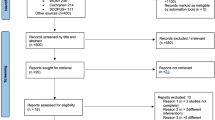Abstract
Data sources
Medline and Embase databases and bibliographies of all included articles and relevant review articles were screened for possible inclusion.
Study selection
Longitudinal studies were included reporting on implant survival, success, incidence of peri-implantitis, bone loss and periodontal status and on partially dentate patients with a history of treatment for periodontitis. There were no language restrictions for the included studies.
Data extraction and synthesis
Authors independently and in duplicate assessed the studies for eligibility and data extraction. Disagreements were resolved by discussion and consensus. The methodological quality assessment of the included studies was done using an adapted Newcastle-Ottawa Scale (NOS). Confounding factors such as smoking, systemic disease influencing osseointegration, chemotherapy and radiation were assessed and adjusted in the analysis. Data were organised into tables and grouped in accordance with the study design.
Results
Twenty-four studies reported in 27 publications were included. Implant survival and success rate were higher in periodontally healthy patients.
Twelve prospective cohort studies, five case series with a control group, four retrospective cohort studies and three studies with a sub group comparison were included.
Bone loss and peri-implantitis were increased in patients with a history of treated periodontitis. More complications were reported in patients presenting with more severe forms of periodontitis. High heterogeneity among the studies in terms of study design, population, therapy, unit of analysis, inconsistent definitions of baseline and outcomes, inadequate reporting and confounding factors meant a meta-analysis could not be performed.
Most of the studies showed better implant survival rates for the non-periodontitis group ranging from 91.67% to 100% compared to the treated periodontitis group 79.22% to 100% over a 1.2 to 16 year follow-up.
Conclusions
Implants placed in patients treated for periodontal disease are associated with higher incidence of biological complications and lower success and survival rates than those placed in periodontally healthy patients. Severe forms of periodontal disease are associated with higher rates of implant loss. The conclusion of the review is limited by the strength of the evidence.
Similar content being viewed by others
Commentary
Dental implants for the last decades are offering a great benefit for tooth replacement.
The Academy of Osseointegration1 suggests that a successful implant therapy is achieved by the therapy, but also by the maintenance of a stable, functional and acceptable tooth replacement for the patient. The success of implant therapy includes the assessment of mobility, persistent pain, neuropathy, loss of function, persistent inflammation, progressive bone loss, infection, prosthesis instability, bone radiolucency, implant fractures and implant loss.2
Few conditions are still considered a risk, which threatens the success of dental implants. Peri-implantitis is a common complication.3,4
The topic of the review is to address the success of dental implants in patients with treated periodontal disease.
The review is an update of the 2008 review, and as the authors reported, the numbers of studies on implant therapy have been increasing in the last few years making a new review important.
A thorough search of new articles was performed. The first outcome sought was success and survival and a second outcome was to assess the status and severity of the treated periodontal disease.
Despite the efforts to provide numerical results, the authors refrained from meta-analysing the results that could provide biased results due to the combination of data from different study designs.
Implant studies frequently reported outcome rates exceeding 95%; even with the bias for industry-sponsored trials it seems a successful technique.4Despite the limitations from the systematic review, periodontitis has an impact on implant survival and should be a point of consideration and discussion with the patient as an implant is still a valuable technique. However, the exact increased risk is not yet measurable.
References
Academy of Osseointegration. Guidelines of the Academy of Osseointegration for the provision of dental implants and associated patient care. Int J Oral Maxillofac Implants 2010; 25: 620–627.
Albrektsson T, Zarb G, Worthington P, Eriksson AR . The long-term efficacy of currently used dental implants: a review and proposed criteria of success. J Oral Maxillofac Implants 1986; 1: 11–25.
Buser D, Weber HP, Brägger U, Balsiger C . Tissue integration of one-stage ITI implants: 3-year results of a longitudinal study with Hollow-Cylinder and Hollow-Screw implants. Int J Oral Maxillofac Implants 1991; 6: 405–412.
Setzer FC, Kim S . Comparison of long-term survival of implants and endodontically treated teeth. J Dent Res 2014; 93: 19–26. doi:10.1177/0022034513504782.
Author information
Authors and Affiliations
Additional information
Address for correspondence: Prof. Nikolaos Donos, Department of Clinical Research Periodontology Unit, UCL Eastman Dental Institute, 256 Gray's Inn Road, London WC1X 8LD, UK. E-mail: n.donos@ucl.ac.uk
Sousa V, Mardas N, Farias B, Petrie A, Needleman I, Spratt D, Donos N. A systematic review of implant outcomes in treated periodontitis patients. Clin Oral Implants Res 2016; 27: 787–844. doi: 10.1111/clr.12684. [Epub ahead of print] Review. PubMed PMID: 26381260.
Rights and permissions
About this article
Cite this article
Veitz-Keenan, A., Keenan, J. Implant outcomes poorer in patients with history of periodontal disease. Evid Based Dent 18, 5 (2017). https://doi.org/10.1038/sj.ebd.6401214
Published:
Issue Date:
DOI: https://doi.org/10.1038/sj.ebd.6401214
This article is cited by
-
Risk Factors for Peri-implantitis
Current Oral Health Reports (2020)
-
Retrospective study to identify associations between clinician training and dental implant outcome and to compare the use of MATLAB with SAS
International Journal of Implant Dentistry (2019)



